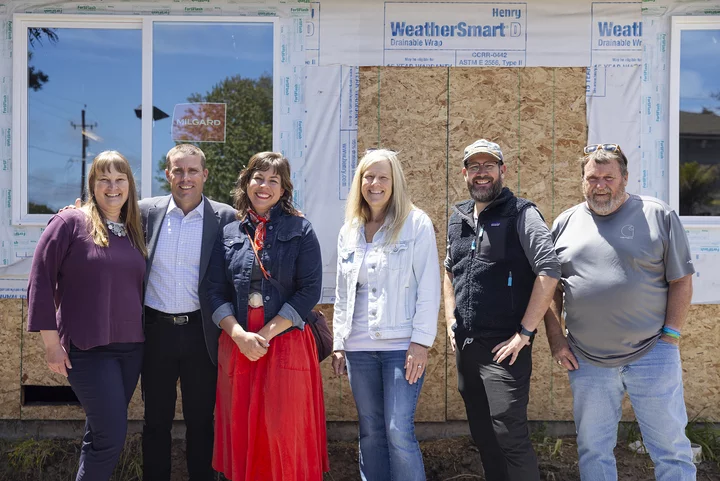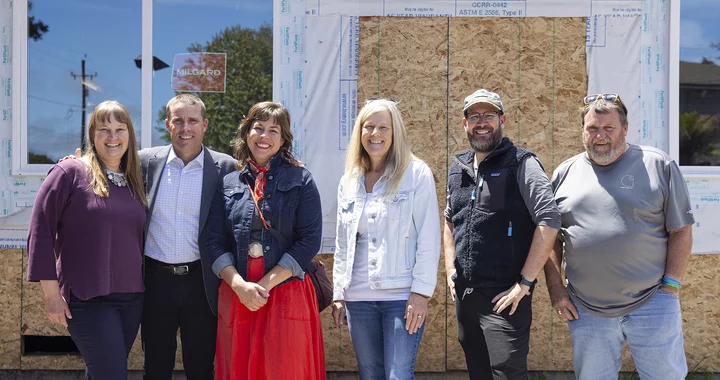
From left: DHHS Legislative and Policy Manager Nancy Stark, Senator Mike McGuire, Humboldt County Supervisor District 4 Natalie Arroyo, DHHS Behavioral Health Director Emi Botzler Rogers, Willow Glen Project Manager David Gilbert and Humboldt County Supervisor District 1 Rex Vaughn. | Image from Humboldt County DHHS.
###
Humboldt County will soon have a new resource in its efforts to help those suffering from serious mental illness. Opening later this summer, the Hyperion Crisis Residential Treatment Facility, located at 528 N. St. in Eureka, will provide around-the-clock care for people who would otherwise be sent to Sempervirens Psychiatric Hospital or forced to fend for themselves at home or on the streets.
“Not only will this facility improve a neighborhood that has long been in disrepair, it will provide a safe place for people to get stabilized and receive the medical care they need,” said Natalie Arroyo, Humboldt County Supervisor, District 4. Outpost on mail.
With $2 million in initial funding from the state, the facility will provide patients with a range of services, including room, board, psychiatric treatment, case management and access to housing resources, all billable through Medicare.
Jack Breazeale, deputy director of behavioral health for the Humboldt County Department of Health and Human Services (DHHS), said many of the people housed at Sempervirens (also known as SVs) are housed there with severe disabilities and poverty, “meaning they’re there because they’ve lost the ability to take care of themselves and meet their basic needs.”
Many of these people are homeless and suffer from substance use disorders in addition to mental illness. “So it’s not a good place to be,” Breazeale said. “So it’s unreasonable to think that SV is going to solve everything in their lives in a few days.”
People can stay at the crisis residential treatment facility for up to 45 days. The average stay at similar facilities across the state is about two weeks. Because it’s an outpatient facility, people can leave at any time, but those who stay are assigned a case manager, therapist and psychiatrist, and are linked to other outpatient services.
The facility, housed in a renovated two-story building, can accommodate 10 patients at a time in five double-occupancy rooms. The county contracted with Willow Glen Care Centers, a Yuba City-based nonprofit, to run the center, staffed by nurses, case managers and mental health workers. Willow Glen already operates similar crisis care centers in more than a half-dozen locations across Northern California.
“We are grateful to the staff at Willow Glen for their work around the clock to support those staying at the facility and the community surrounding the facility,” Arroyo said. “We are so grateful to our funders and partners in this effort!”
Breazeale elaborated on who will benefit most from the new facility and the services it will provide: Some patients have recently been discharged from Sempervirens and may be concerned that without further support, they will quickly revert to their old ways and fall back into the thinking and behaviors that led to their hospitalization.
Others, for example, may be people who are distressed and brought to a local emergency room but, upon evaluation, don’t quite meet the mandatory criteria for a 5150 psychiatric admission. Hospital employees and other medical professionals can recommend a stay at Hyperion, which could help avoid the need for acute hospitalization.
Meanwhile, Sempervirens Hospital’s 16 beds are often full, and Breazeale said he has high hopes the new Hyperion Centre will alleviate some of that pressure.
“I’m really excited,” he said. “It’s finally happening.”
A significant portion of the people housed at Sempervirens are under the county’s legal guardianship under provisions of the Lanterman-Petris-Short (LPS) Act. These people are sometimes housed as SVs because the county has been unable to find a long-term care facility. Breazeale said that once Hyperion opens, some of those patients could stay there during their waiting period.
A big benefit of the facility, he added, is that it will help ensure residents are taking their medication as prescribed.
“Typically, we lose patients because of medication adherence,” Breazeale said. “Here, they get at least 14 days of consistent medication in their system, they get on a cadence, and they have a case manager with them. [who will] We will take them to the pharmacy to pick up their medication and then take them home.”
Residents can also access health screenings and other appointments through the Open Door Community Health Center.
The care provided at the facility will be covered by Medicare rebates and the Mental Health Services Act, a tax on billionaires passed by California voters in 2004.
The county hopes to open the Hyperion Crisis Residential Treatment Facility by Aug. 1.
“We’re excited about the impact this initiative will have on our Sempervirens levels, our local emergency rooms, and the community at large,” Breazeale said. “It will really ease congestion and allow people to get the help they need.”


